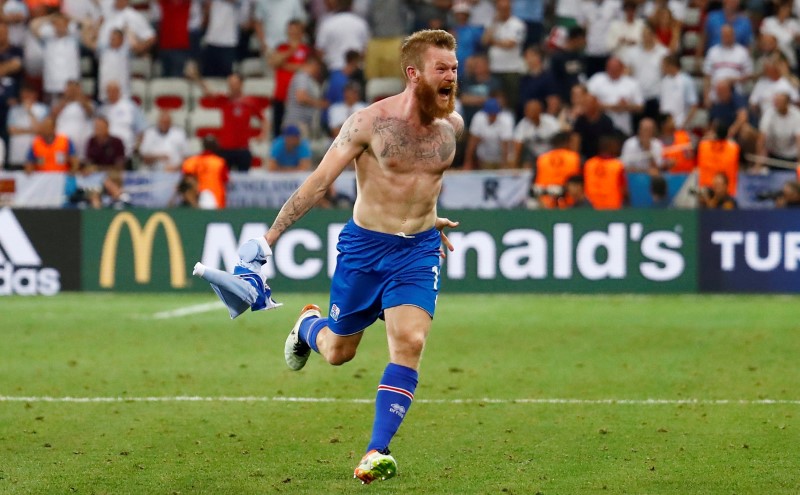By John Irish
PARIS (Reuters) – Iceland’s fairytale progress to the last eight of the European Championship is just what the competition needs to prevent it going stale and a model for smaller nations to realise their dreams, UEFA said on Tuesday.
The smallest country ever to compete at the Euros surprised soccer fans around the world after comfortably knocking out England, the overwhelming favourites for the game, 2-1 on Monday night to set up a dream tie with hosts France.
But UEFA’s interim General Secretary, Theodore Theodoridis, said the victory was not entirely unexpected after the country of just 330,000 people invested heavily in recent years to develop its soccer infrastructure.
“It’s a model. We will be using it as a positive image for the expansion (to 24 teams),” he told reporters.
“It’s pleasant for football to have one or two Cinderella stories. If you always have the same eight teams qualifying it becomes a little boring.”
Fellow minnows Wales, too, have made it to the quarter-finals, which also include former champions Germany and Italy.
Theodoridis, who more or less ruled himself out of running for UEFA’s presidential election next September, said that Iceland’s success was not a surprise.
“You could see it coming — maybe not beating England, but you could see they would be competitive and would end up in a final tournament,” he said.
“If you look back over the last four years their under-21s and under-19s qualified more often than in the past.”
Much of the success story, Theodoridis said, was down to the Icelandic soccer association’s decision to create the infrastructure for people to play the game all year round despite extreme weather conditions.
In 2008, the association set up a fund, with the support of UEFA’s HatTrick financial assistance programme, to build and renovate grounds, pitches and in particular indoor facilities.
“It was in the middle of their financial crisis and so they needed HatTrick desperately far more than others,” he said.
OPPORTUNITIES FOR MINNOWS
Theodoridis, who played a key role in developing Greek football before the country’s shock triumph at Euro 2004, said other smaller nations, could learn from the Icelandic example.
“Iceland, because of the extreme weather conditions, were obliged to do it,” he said. “Other countries perhaps spread (investment) around … without putting indoor halls as a priority.”
Euro 2016 was expanded from 16 to 24 teams to give opportunities to countries — and their fans — who might not otherwise have qualified to experience a major tournament.
Some critics have said the quality of the tournament has slipped, with teams playing too defensively and the format creating confusion and unfair conditions for certain sides.
“At the end of the day you have eight more countries that have strongly helped develop football in their countries,” he said. “You’ve raised the competitiveness and raised the possibilities for people to dream.”
When asked whether a 32-team tournament could happen, he said there would be a reflection ahead of the 2024 championships.
“Before the tournament, I would have said yes, 32 is too much, but right now I have no idea. In a final tournament, perhaps it would be better, but in qualifiers with 55 teams how would it work? You have to assess everything.”
(Reporting By John Irish,; Editing by Neville Dalton)


